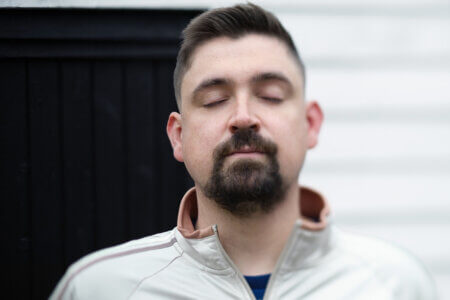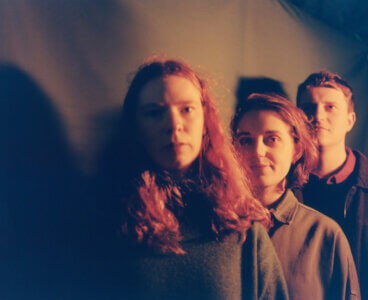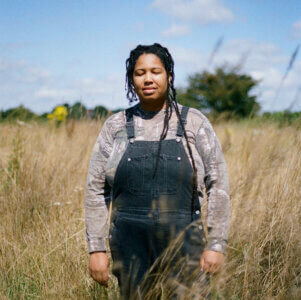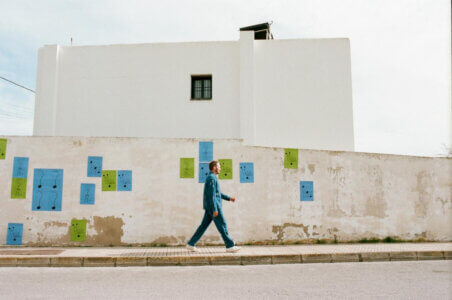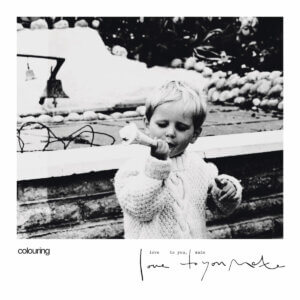Complete Mountain Almanac Heal Through Their Art
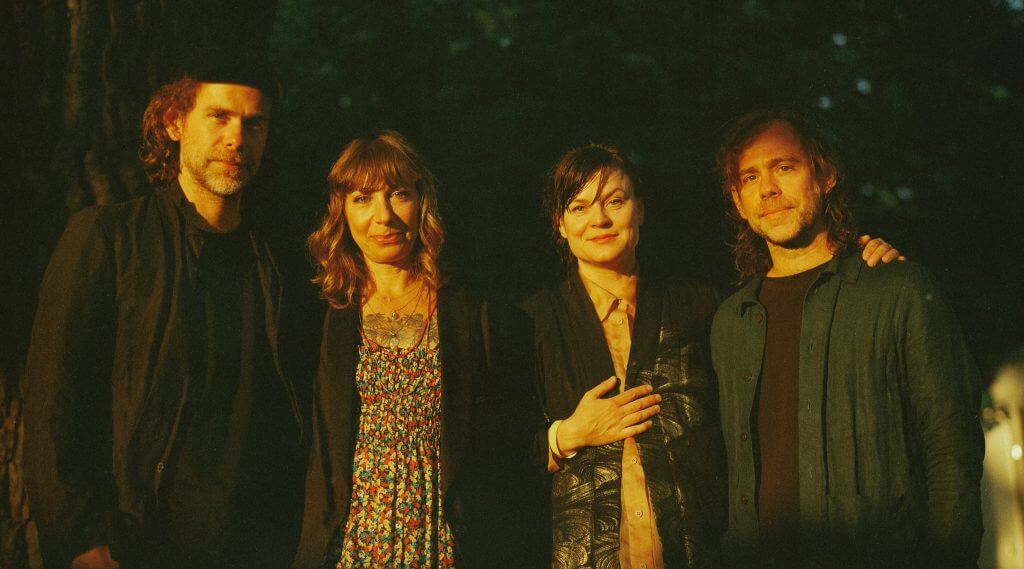
Friends for close to two decades, Norwegian-born and Sweden-based composer and singer Rebekka Karijord and Italy-based poet, dancer and multimedia artist Jessica Dessner combined their respective artistic mediums on their self-titled debut record, Complete Mountain Almanac. The record, which spans enveloping folk melodies, chamber op and electronic motifs, explores themes that are both global and personal. Co-produced by and featuring performances from Jessica’s brothers, revered musicians, Bryce and Aaron Dessner.
We spoke about how Complete Mountain Almanac created a space for healing through their harmonious collaboration, their unique approach and process in building this body of work and what it was like working with family.
Northern Transmissions: There are a few different creative elements involved in Complete Mountain Almanac stemming from your different artistic outlets; Rebekka, you’re a composer and vocalist and Jessica you work as a poet, dancer and multimedia artist. You’ve been friends for around 15 years, prior to making music together as Complete Mountain Almanac, did you speak a lot about your respective art before working together? When did the prospect of collaborating through this project come about?
Rebekka Karijord: Over the years, we didn’t have a lot of contact. We had one or two really nice meetings in 2006. I had Jessica’s poetry book sitting on my shelf and, quite often, I would go back to one poem thinking, ‘I want to write some melodies to this poem’. I never got around to doing that. But that was the reason why [Jessica] was the person I contacted when I started thinking about this thing – that wasn’t yet called Complete Mountain Almanac – needed words. So, yeah. It was kind of like, you know, sometimes you meet a street or a city or a place in the forest, or a person, even more often, or a song or a book. And they hold something for you, you might not know what it is, but the feeling is very strong. It was like that for me with Jessica and her poetry. I really felt that we were supposed to do something together.
Jessica Dessner: The project started after I moved to Italy in February 2016. Rebekka had gotten in touch and asked if I wanted to provide visual elements and writing for a project that she was dreaming up. It was fairly loose at the time; it involved the 12 months and addressed the environment. Climate change was the initial frame, again, it was very, very open though. I work in so many different artistic forms and because I’ve been a performer and always surrounded by musicians and artists, I’ve been in and out of these sort of collaborative, multimedia projects over the years. I’m aware of how, at times, they go somewhere and there are times when they don’t.
I love that type of synthesis of all these different mediums coming together. I’ve always had one of those projects boiling or bubbling over the years. But I didn’t have one at that time and I was like, ‘Oh, good! Yeah, let’s try that!’
But you always get involved knowing that, as I said, it may not go anywhere or it morphs into something completely different. Then some support came through and we hadn’t really gotten started at all when I was diagnosed with breast cancer. That took hold of everything and I kind of went M.I.A. for a period of time but then I got a really incredible note from her saying that if I wanted to use the project to deal with everything I was going through, she was giving me the space for that. And that’s exactly what happened.
NT: It’s so interesting to listen to the album knowing that initially there was a desire to tackle climate change as a theme but then Jessica, your diagnosis and relationship with your body came to the fore. Prefacing the album, you describe the melding of those two sources of inspirations as a “potency of nature”. The lyrics came from a book of poetry you wrote following your diagnosis and treatment, how was writing those poems for you? Did it help with the emotional recovery from that period? How is it listening back to your writing from that time?
JD: You know, it was interesting because so many spans of the writing that ended up in those poems were written as journal entries for pieces that got very little editing. Writing has always been a part of my…I wouldn’t even necessarily say my creative process. It’s something I’ve always done. Prior to this manuscript being complete, which became the book called “Complete Mountain Almanac”, I really had never processed or turned a personal experience into a body of work or a creative project. I really hadn’t gone there before, it was the most deeply organic process I’ve had, I’d say, as an art-maker.
It was one of those experiences where when I finally sat down in September of 2018 to write, I just did it. Typically the way I work is that I’m always very involved in all the different mediums that I use. And this was a different experience because I was physically not capable of doing all the things I would normally do. I just sat down and wrote non-stop. I wrote that manuscript and I incorporated some older bodies of writing as well that hadn’t really taken off. So, there was a bit of that in the book. But what was so interesting was what Rebekka chose for the songs from those writings. I was so amazed to see that so much of what Rebekka chose to put into the songs, because the poems are much longer, came from those very in-the-moment bits of writing that I’d done. In terms of how it affects me or influences me now, it’s all as essential and healing as it was in the moment. It’s very, very vital to me because I don’t think you ever really fully move on from cancer.
NT: Rebekka, I was fascinated by the way the album was structured with each song named after a month and maintaining the chronology of the calendar. What was the initial inspiration for you – climate change, obviously – in building the musical world around the lyrical themes?
RK: I tend to create frames for myself whenever I work on my own projects. I do a lot of commissioned work; a lot of film music, too. I find that I really thrive under setting a frame before I get going on my own work. It makes me safe and it creates a limitation that feels really healthy for my writing. So, the thought of the twelve months was part of that kind of framework. Then, I was going back to what we talked about earlier with that email after Jessica had gotten her diagnosis and having that idea of using something so intimate and private and turning it into an artistic work; I’ve always worked like that.
All of my records have been this fine balance between intimate and personal and where it is universal. If I can manage to make it big enough, but still close enough to my own friction point. It’s sort of like having a way to understand what hurts. I had never gone through cancer so I couldn’t understand how that felt for Jessica at that moment. But I think it was really natural for me to think, ‘Oh, this frame could help her, or be useful somehow,’ because that’s how I have always worked.
Then, as for writing, it was a very brutal process when I look back at it. Jessica’s poems are so amazing in their full form; they’re so multi-faceted; super close and big at the same time. And so expressive, intelligent and emotional. They contain so much. I just sat by the piano and had them in front of me and took a marker and was like, ‘Ok, I’m going to sing that, and sing that,’ by marking off line. The songs came together very fast from there. I don’t think I played much to Jessica before I felt like I had a collection of songs. Once I got to that point, I started sending bundles of demos.
And Jessica didn’t have a lot of, which I really appreciated, criticism or comments. She really understood my process. I actually went back to one of our old emails the other day because was looking for some demos and I saw Jessica saying to me several times, ‘Trust your process’. She never interfered with my process. She was very respectful in that way. You know, acknowledging that I was taking over my part of the project which was very necessary for me because of how I am as a person when I write.
This project has had so many different rounds of trust between us, and between everyone involved. You know, handling over very close-to-heart material, showing yourself so vulnerable, putting something like that in someone else’s hands and trusting. It continues being that, in a special way.
NT: Rebekka, you’re based in Sweden and Italy is home for you, Jessica. You came together to record the album in Paris St Germain. What led you there to create a base?
RK: I think it was because Bryce and Aaron were both in Paris, right?
JD: Yeah, they were both there. It was a little spell of time where they were both living in Paris and it was a case where, you know, it’s always very hard to get everyone together – my brothers, in particular – in one single spot unless it’s a National show!
RK: It was really interesting because when Jessica played the demos for her brothers they wanted to get involved. But, it was quite a long period from when that was decided to when we actually managed to gather everyone together because, as Jessica said, it’s tricky to gather four people with different lives in different countries in one place. Then miraculously, we got this one week, days before lockdown, to get into the studio and record.
JD: Fortunately, we managed to get it all done in that time before the lockdown because otherwise I don’t know if we would have gotten the album made.
NT: Wow, so it was recorded in that short space of time and then Rebekka, you added the extra elements and textures like the horns and synth parts during the global lockdown?
RK: Yeah, exactly. Also, Aaron and Jon Low really wanted to mix the record, so I was finding the time to get everything done for that. Bryce wrote string arrangements for 24 string players and elsewhere, I added overdubs and produced the recordings afterwards. It didn’t need much, but there was definitely some work with the presentation of the voices; what should be muted, what should be left out.
It was really special, the recording process. Recording is such a sensitive situation because music is a vulnerable beast. It can really die if you’re unsafe, or it can blossom if you feel like everyone’s on equal terms. And I think I was a little nervous about that, not because Bryce and Aaron are super famous, but because I was working with three siblings! I was wondering how I was going to find my space within their dynamic.
By that point, though, I was so submerged in the songs and they felt as much my songs as the work that’s on my solo records. We decided to do something wise with the songs which was to do everything live in the studio with two guitars and voice. Jessica was there, also, with lyrics along the way and as our expert ears in the control room.
The recordings really had a very special verve from the start. It was a magical recording week; it was absolutely beautiful.
NT: Jessica, how was it for you working with your brothers on this project? Were you ever nervous working with siblings on something so personal and vulnerable through this collaboration with Rebekka?
JD: No, not at all because they’re my stinking little brothers and I’m the big sister! And they’re…
RK: They’re really professional!
JD: Yes, that part is very true. We were all on our best behavior, I would say! I mean, there have been so many collaborative, creative little projects – things that no one ever really saw -that we’ve shared together. There were times where, whether it was my house that I lived in for thirteen years in Brooklyn being the space where Alligator was recorded or contributing choreography to something that they’re doing on stage, or giving feedback to lyrics or song order for records. There have been so many different things we’ve collaborated on over them years. When I was still making dances, Bryce had a band called Clogs that I did a full evening- length piece for in, I think, 2003. So, it’s always been completely organic for all of us to work together and as much as my brothers have that twin symbiotic thing, I would say that by extension we have a similar thing, sibling-wise.
NT: Something I found so effective across the album was the building of the soundscapes around the mantras or repeated phrases. “October” hears the refrain, “So the earth and the body,” while the closing line on “December” is, “Without responsibility.” What was the driving force behind incorporating those mantras within the arrangements?
RK: I’m really glad you noticed that because that was one of the things I like the most about the songs. I love the line in “April”: “I am faithful, I’m not faithful.” I feel like this album is very much like a soliloquy; having a conversation with oneself. You know there’s an audience but the conversation is with oneself. I felt that way when I read the poems. This is a voice of someone who is trying to understand something and to heal something along the way. To find light and hope through the pain.
For me, also, the months symbolize how – especially as a Scandinavian – we rely so much on the predictability of these months of the year. We’re so cyclic in how we think upon how the light changes each month. How does January compare to February? That initial thought was important for me to think about working with the months because, also, February 2023 doesn’t look like February 1985, there’s something in that.
There’s something very cyclic with, how I’ve understood from Jessica, the way cancer treatments are laid out. I think the mantras are part of that. The conversation with oneself and trying to find comfort. Trying to find strength. Trying to understand. And the words were very inviting, too.
NT: Finally, having lived and gone through the experience together and shared an artistic practice so closely, how has Complete Mountain Almanac changed your friendship and perhaps your approach to subsequent projects?
RK: Oh, yeah, it’s changed our friendship forever. Jessica is one of my best friends.
JD: We’re already talking about our next project. It’s a lifelong love that we’ll keep returning to and I can’t wait to keep making things with Rebekka and seeing where everything goes. It’s really beautiful. The thing that was the most remarkable, and it’s always for me the most important thing, is the process. I’m so grateful that we have this physical record that will be in the world but what I loved the most was what we did during the process. How that process moved me through my suffering to a place that has brought me to a distance from my suffering and has brought beauty and meaning, instead. It’s a real gift.
Purchase Complete Mountain Almanac by Complete Mountain Almanac HERE
Latest Reviews
Tracks
Advertisement
Looking for something new to listen to?
Sign up to our all-new newsletter for top-notch reviews, news, videos and playlists.





